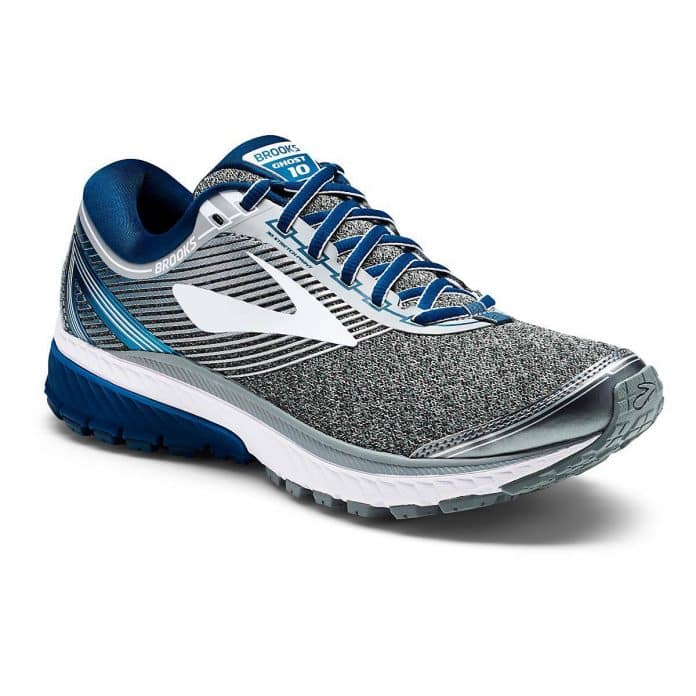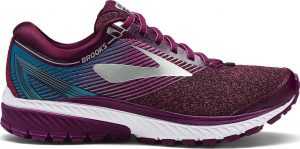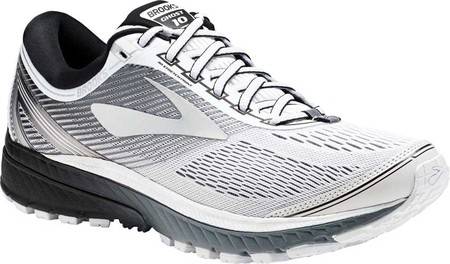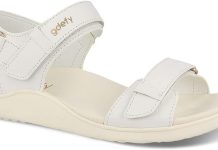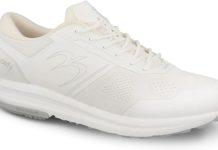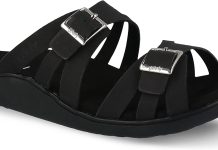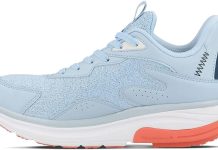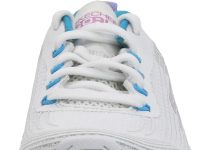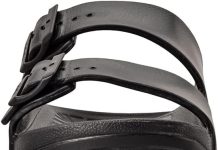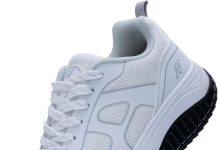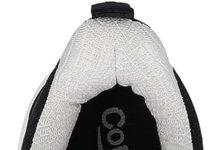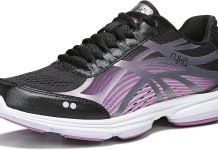INTRODUCTION
A few years ago, we were outraged when Brooks swapped its DNA Gel midsole for an all-foam one. The outrage wasn’t so much about the foam midsole per se; after all, brands constantly change their cushioning technologies.
It was instead an issue of semantics. Brooks described the new ‘DNA’ foam as it did the Gel, which we thought was somewhat misleading. But that was back in 2014, and the whole DNA foam-gel thing is a non-issue now – at least from a marketing perspective.
The all-foam Ghost has also grown on us over the past few years, based simply on the product’s merit.
The rest of the footwear industry is on a penny-pinching drive. Many new running shoes in the $110-130 price band are stripped-down versions of their former designs, relying heavily on minimal design language and material specs to reduce manufacturing costs. This approach also applies to some of the more expensive shoes.
Brooks’s design approach contrasts; they use shoemaking materials that look and feel premium. Even though Ghost 10 isn’t Brooks’s most expensive neutral shoe (the Glycerin is), it is heads and shoulders above the rest regarding the level of materials used.
But will Brooks’s material generosity last for long? I can’t say for sure, but let’s enjoy this fleeting moment.
The Ghost 10’s upper fits just right, neither too snug nor excessively spacious. The midsole doesn’t have the springy feedback of Boost or Everun, but there’s cushioning in plenty. The latter’s consistency of upper fit and ride quality also strengthens its case as a versatile everyday neutral trainer.
And what about the changes between Ghost 9 and 10? We’ll eventually cover this topic in greater detail, as we always do. Still, the summary is that the new Ghost 10 increases forefoot room, is more flexible, and is a bit softer and lighter than the outgoing model.
DESIGN AND MATERIALS
Most Ghost 10’s uppers are engineered mesh and high-density printed layers. Brooks’ marketing name for this is 3D Stretch Print, a nod to the printing’s semi-elastic nature.
The Stretch Print is applied over the mid and rearfoot, while the forefoot is built of engineered mesh. Near the midsole edge and over the forefoot are narrow bands of tightly knit mesh areas, and in between are zones with larger pores for ventilation.
Last year’s Ghost 9 had a fused toe cap with a small ‘canopy’ extending over the big toe. That changes on the Ghost 10, which now uses a regular, stitched-on toe bumper. The Ghost 10’s forefoot gets an updated engineered mesh, reducing the 3D Stretch print material over the sides.
These updates affect the Ghost 10’s fit character—something we’ll cover when discussing the upper fit later in this review. The new Ghost also has other design tweaks, such as the updated (and cleaner) lacing and external heel areas.
This year, the laces are round compared to the Ghost 9’s flat ones. Despite their shape, Brooks’s laces are soft and semi-stretchable, and they stay tied down. So, there’s little functional impact here; instead, it’s a matter of personal preference.
The heel gets some bling in the form of metallic-colored molded urethane decorations. We say they’re decorative because the heel already has support due to the rigid internal counter. Over the heel center, the synthetic strip of the Ghost 9 has been replaced with molded mesh.
Reflectivity gets affected here, as they disappear with the Ghost 9’s stitched synthetic. The small ‘DNA’ logo on the midsole and the tongue label are the only shiny bits the Ghost 10 has.
For the last few years, Brooks has relied on a two-mesh set-up to construct the heel collar design. One kind of mesh lines up the Achilles area, while another forms the rest of the heel collar.
That changes with the Ghost 10, which uses only a single mesh to line the heel’s insides. Also, there’s more foam padding inside the heel over the Ghost 9, so the heel interiors feel smoother overall.
The Ghost has never had an inner sleeve, but tongue slide was prevented by using a ‘tongue-tied’ loop. The Ghost 10 doesn’t have a sleeve either, but the tongue now has two loops instead of one. So, these loops securely hold the plushly padded tongue, preventing tongue slide altogether.
Ghost 10 is slightly lighter than its predecessor due to the elimination of layers; its weight has been reduced by 0.3 ounces.
Read Next – Brooks Ghost 11 Shoes – Soft and Responsive Shoes with Secure Fit
Brooks Ghost 10 Review: Your Guide to the Brooks Ghost 10
If you’ve been keeping up with the Brooks Ghost series, you’ll know what we mean when we say that the Ghost 10 feels similar to the Ghost 7.
With a softer ride, the Ghost 7 was the first all-foam-based model after the Gel-based Ghost 6. A similar analogy applies to Ghost 10; Ghost 8 and 9 were firmer riding models.
The Ghost 10’s midsole construction is similar to that of the Ghost 7, with a separate crash pad on both sides. In contrast, the outer/lateral midsole of the Ghost 9 had a single-density construction.
These updates also mean that the Ghost 10’s forefoot midsole is now single-density instead of the twin-stack of the Ghost 9. The result is a noticeable increase in forefoot flexibility and softness over the last version. The outsole flex grooves’ design has little to do with the added flexibility; this change is material and construction-dependent.
The midsole walls also flare higher on both sides of the midfoot. The midsole slopes upwards from the forefoot to the midfoot, melding into the rearfoot.
The material hasn’t changed, however. The foam continues to be Brooks’s Biomogo DNA EVA foam, and the construction and density make the Ghost 10 a softer Ghost.
If you’ve read our Glycerin 15 write-up, you’ll recognize the common update theme applied to both. For example, a section of the foam midsole (under the midfoot) now swoops down to form part of the outsole. This is designed to soften the midfoot transition experience.
Other design aspects are borrowed from the earlier Ghosts. The rounded heel outsole is split into two near the edge, allowing for smoother landings. An open section of midsole foam is right under the heel, which splays wide during landings to produce a cushioning effect.
The removable insole placed inside the upper hasn’t changed. It is the same thick BioMogo foam sockliner used on the past versions of the Brooks Ghost.
Read Next – Asics Gel Kayano 24 Review
DURABILITY ASSESSMENT
Like many Brooks shoes, the soft outsole rubber will be your primary durability concern. Brooks gives in the outsole grip because it takes in the outsole lifespan. The rubber provides excellent grip but has lower durability compared to its peers. Whether you’re a forefoot or rearfoot striker, the frontal section should be the first to shred.
Another area you should watch is the forefoot mesh. Compared to Ghost 9, most of the front mesh does not have external reinforcement and feels thinner.
Since the mesh is directly glued to the midsole, watch out for early wear signs due to abrasion and repeated flexing.
The Ghost 10’s midsole is noticeably more pliable than the Ghost 8 or 9, translating into an increased flexing action for the upper mesh.
Read Next – Brooks 10 Road Running Shoe
UPPER FIT AND FEEL
The Ghost 10’s upper fit is an improvement over the 9. Last year’s model had a more extensive, fused-toe bumper with an extension over the big toe, which made the toe box relatively cramped, so the increased space in the Ghost 10 will be a relief.
By removing the 3D Stretch print in the forefoot and shortening the synthetic toe bumper, the Ghost 10’s toe box gains vertical and sideways space.
The upper breathes better, too, and is accommodating. The Ghost 10’s mesh isn’t as stretchable as the Glycerin 15’s.
As expected of an upper, the insides are smooth and nearly free of stitched overlays. Thanks to the dual loops, there’s no tongue slide, and the generous padding filters the lacing pressure.
The heel collar has a smoother fit now. The switch from dual-mesh to a single-mesh lining results in a more consistent feel, and this sense of increased padding is packed within.
The rear upper grips exceptionally well. When new, the Ghost 10’s Achilles dip slopes inwards—more so than the Ghost 9—which leads to a temporary lack of toebox room as the heel pushes the foot forward. But after a week or so, the heel padding settles in, making the Ghost 10 fit true to size.
So, if you feel that the Ghost 10 is slightly shorter in size, this feeling should dissipate as you put on miles. Get the same size as the Ghost 9, or buy proper to an extent if you are new to the Ghost.
Read Next – Asics Gel Kayano 25 vs Kayano 24 Running Shoe
RIDE QUALITY AND BEHAVIOR Ghost 10 Road Running Shoe
The Ghost 10’s ride represents an optimal meld of cushioning and support. There’s a distinct softness underfoot, but it isn’t mushy either. But the newest Ghost is softer if you compare the 10 to the 9. This is because of two reasons.
The first is the updated midsole with a separate crash pad under the heel. The second is the lighter density of the upper midsole foam, which is softer than before.
This also translates into a single-density forefoot on the Ghost 10, which is different than the dual-density design of the Ghost 9.
Combine these updates, and you get a softer ride under the heel and the forefoot. While the cushioned insole inside the upper delivers a similar cushioning level, the softened midsole foam changes the Ghost 10’s ride character. The forefoot is softer, as the entire midsole thickness is constructed using a single-density (and more peaceful) foam.
That said, the rearfoot doesn’t lack support. The crash pads in the lower midsole are firmer than the upper portion, and these structures keep the midsole stable. It is also essential to highlight the higher arch flare of the Ghost 10’s midsole. This change in the sidewall design makes the shoe feel more supportive under the arch than Ghost 8 and 9.
The transition quality is average, as the softer midsole slows the loading process. This is particularly noticeable under the forefoot, where the softer, more flexible base makes the push-offs a bit lazier.
So, depending on how you like your neutral trainer served, the Brooks Ghost 10’s added softness could be viewed as a double-edged sword. A softer midsole makes for a plusher ride experience, but at the same time, you’ll miss the rock-solid stability of the Ghost 8 and 9.
Nonetheless, the Ghost 10 is a great neutral shoe for training runs of any distance. It has ample cushioning for a marathon and is stable enough for a quick treadmill run.
You won’t get the bouncy responsiveness of foam technologies like the Adidas Boost or Saucony Everun.
Read Next – Brooks Ghost 11 Shoes – Soft and Responsive Shoes with Secure Fit
PROS AND CONS
The Ghost 10’s biggest strength is its versatility. The upper fit hits the sweet spot of interior space and secure hold, which applies to the balanced ride character. This versatility gives the Ghost multi-role capabilities to tackle marathons or the occasional training run.
We like using premium materials in running shoes, a fast-disappearing trend saves for shoes such as the Glycerin, Ghost, and a few Saucony products. There are no evident signs of cost-cutting on the Ghost, translating into a running experience worth every dollar of its $120 MSRP.
Below, the outsole grips well, and the density consistency of the upper midsole and the BioMogo insole give the ride its characteristic smoothness.
Now for the cons. The outsole durability has always been an issue, so the premium material package amounts to nothing when the underside tends to wear and tear faster than shoes from, say, the Adidas or Nike stable. Then, there’s the staid plainness of the DNA foam material, which provides the expected (and ordinary) foam-based cushioning and nothing more.
You’ll also have to live up to the blemishes and finishing defects in some examples of the Ghost 10. We’ve often highlighted this issue in our past reviews (G7 review), and some production models might have skewed assembly or glue marks. So, visually inspect any Brooks shoe before you buy.
Read Next – 10 Brooks shoes
Brooks Ghost 10 GTX trainer review – Running Ultra
SUMMARY AND CHANGES BETWEEN THE GHOST 9 AND GHOST 10
A few things will stand out when comparing Ghost 10 with Ghost 9. The first is the softer ride quality, including a more flexible forefoot. Earlier in this review, we’ve covered why this occurs.
The second update is the increased space in the toebox, resulting from a redesigned toe bumper and an open forefoot mesh construction.
Other minor changes, such as the 0.3-ounce weight reduction, the increased under-arch support, and the updated heel area, but the ride softness and the toebox space are the most critical updates.
If you spend $30 more, you can get the Glycerin 15. What’s the difference? The Glycerin has a plusher interior and slightly more stretchable mesh, and the midsole is more supportive and cushioned.
The Ghost 10 feels like a much lighter shoe compared to the Glycerin, though the actual weight difference isn’t much. This is perhaps so because the Glycerin 15 feels relatively bottom-heavy, and there’s a sense of more midsole material than the flexible Ghost.
The new Brooks Revel is at the entry level with its new knit upper and a single-density midsole. Much like Launch 4, there are no additional widths.
RECOMMENDED ROTATION
Ghost 10 is a comfortable and versatile shoe, but not very fast. So what do you do then for speedier training runs? You get the much firmer and snugger-fitting Launch 4. And if you’re used to firm riding shoes, the lighter Launch 4 can also be used for longer races.
For shorter 5K and 10K races, the Brooks Hyperion is your go-to shoe.
The Hyperion equivalent would be the sleek New Balance 1400V5. It has a secure yet breathable fit and enough cushioning for shorter runs or races. Now, let’s explore some options outside the Brooks assortment.
Consider the firm riding Nike Zoom Elite with its short forefoot feel for general fast-paced training runs.
SIMILAR NEUTRAL CUSHIONED SHOES
Various neutral trainers are available in the same price class and category, but the New Balance 880V7 matches the Ghost 10.
Like the Brooks shoe, the 880V7 has a regular dual-density EVA foam midsole with similar support and cushioning levels. The upper partly resembles the Ghost with its engineered mesh and fused overlays – except for the 880’s shallow toebox and tongue slide.
If you’re shopping for Asics, the Cumulus 19 is the Ghost equivalent. It has a comfortable dual-density ride but with a shallow toe box.
The UnderArmour Gemini 3 is comparable, but solely from a category perspective. The Speedform upper design and materials feel and fit differently from the rest of the list’s shoes. Underneath, the Gemini 3 comes with a smooth and supportive ride.
The Mizuno Wave Rider 20 has a ride quality that runs tangential to the rest of the pack, made unique by the hard plastic ‘Wave’ plate embedded in its midsole.
Lastly, you have two popular neutral trainers: the cushioned and responsive Pegasus 34 and the snappy Saucony Ride 10.

